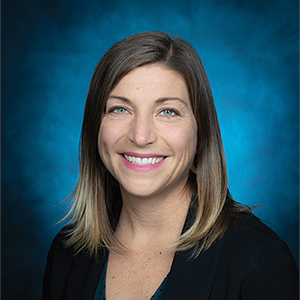
Developing Water Policy Solutions that Ensure a Just and Resilient Future
Water is one of Earth’s most precious resources, and although it’s abundant, water quality and access are not always equitably distributed. The impacts of decisions made about water resources and infrastructure are far-reaching, affecting not only the daily lives and health of all people but also broader patterns of environmental and climate change. How can we best support water and climate policy solutions that ensure a just, sustainable and resilient future? This is the focus of Sara Hughes’ work.
“Our complex infrastructure systems, like drinking water and stormwater infrastructure, are very much related and jointly underpin sustainable and resilient cities,” says Hughes, a SEAS associate professor and leader of the Water and Climate Policy Lab. “My research is focused on two specific water policy issues that are important for the Great Lakes region: stormwater flooding in our cities and coasts, and drinking water access and affordability. The ultimate goal for these projects is to generate insights that can inform decision-making at the local, state and national levels.”
Stormwater and Flood Management

Hughes’ team recently completed a project with Great Lakes Integrated Sciences and Assessments, which evaluated current state policies in the Great Lakes region to determine how well they are supporting flood management and planning by local governments. The study evaluated innovative actions that would enable local flood resilience in four policy areas: funding and financing, information provision, regulations and standards, and planning guidance. It also identified evidence of states prioritizing social equity within policies and programs.
The study’s findings showed that some states are leaders in this area, while others have further to go. Michigan landed in the middle of the pack but didn’t exhibit much evidence of prioritizing social equity, which Hughes says is essential. In another project, funded by the Graham Sustainability Institute, Hughes’ team built a practical resource toolkit to help city officials center their decisions on racial justice.
Collaborating with Landscape Architects to Inform Stormwater Policy
Alongside SEAS Assistant Professor of Landscape Architecture Runzi Wang, Hughes has launched an interdisciplinary study of Detroit’s Rouge River that will utilize watershed water quality data from the Michigan Environmental Protection Agency and the U.S. Geological Survey to help understand how urban form (the physical characteristics that make up built-up areas) and local policies contribute to urban water quality. According to Wang, the integration of landscape architecture expertise in this type of study is a novel approach. “I believe this is the first trial to link upstream policy and other top-level factors all the way downstream to the environmental outcomes. We’ll try to understand what happens in between,” she says. “Urban form is a very important mediating factor, and we’re looking at the big picture by combining policy, landscape architecture, urban planning and water quality.”

Will Sollish, who is pursuing a master’s in Environmental Policy and Planning, and Erin Posas, who is pursuing a master’s in Environmental Justice, are assisting with the project. Sollish notes that the project is helping them understand how urban form, residential decision-making and policy come together to affect urban water quality, while Posas says it offers an opportunity to understand how policy works in practice. “Focusing on the Rouge River grounds our work locally, enabling us to support the community we live and work in,” she says. “As a student, I see this as an exciting opportunity to build on years of research and continue the work of peers who have worked to protect water quality before us.”
Drinking Water Risk and Resilience
As for drinking water, Hughes says that cities across the nation are facing immense fiscal stress that has been brought on by the confluence of increased demands for critical city services and declines in revenues needed to support those increased demands. Financial stress can present a significant risk to the resilience of services that people depend upon, which is why she, along with four SEAS and two U-M Taubman College of Architecture and Urban Planning students, is working to generate a new, publicly accessible database for scholars and policymakers. Building on this National Science Foundation-funded national study, Hughes is part of a three-university team that has a contract with the state of Michigan to explore how regionalizing drinking water management and infrastructure might help financially strapped cities make their resources stretch further.
The project team has compiled and matched details about the drinking water systems of more than 2,000 cities nationwide to develop the Municipal Drinking Water Database, which integrates information about drinking water systems and cities including local government spending and revenue, election outcomes, demographics, institutional contexts and drinking water system conditions and characteristics.
“This new database will be a fantastic resource for both scholars and decision-makers who are interested in better understanding broad trends in drinking water spending and investment, and more specific hypothesis testing around why some cities are struggling to maintain reliable services and others are not,” says Hughes. “We are excited to make this information public and see how the community will use it.”

